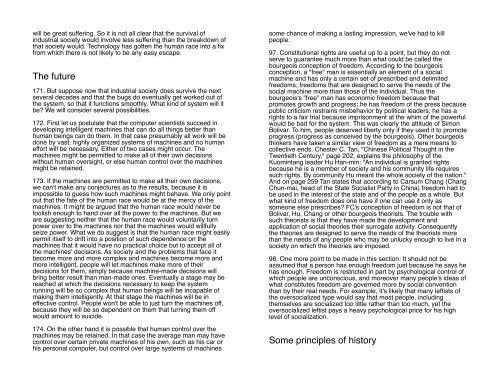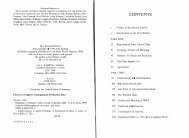and without interference, manipulation or supervision from anyone,especially from any large organization. Freedom means being incontrol (either as an individual or as a member of a small group) ofthe life-and-death issues of one's existence; food, clothing, shelterand defense against whatever threats there may be in one'senvironment. Freedom means having power; not the power to controlother people but the power to control the circumstances of one's ownlife. One does not have freedom if anyone else (especially a largeorganization) has power over one, no matter how benevolently,tolerantly and permissively that power may be exercised. It isimportant not to confuse freedom with mere permissiveness (seeparagraph 72).95. It is said that we live in a free society because we have a certainnumber of constitutionally guaranteed rights. But these are not asimportant as they seem. The degree of personal freedom that existsin a society is determined more by the economic and technologicalstructure of the society than by its laws or its form of government.[16]Most of the Indian nations of New England were monarchies, andmany of the cities of the Italian Renaissance were controlled bydictators. But in reading about these societies one gets theimpression that they allowed far more personal freedom than oursociety does. In part this was because they lacked efficientmechanisms for enforcing the ruler's will: There were no modern,well-organized police forces, no rapid long-distance communications,no surveillance cameras, no dossiers of information about the lives ofaverage citizens. Hence it was relatively easy to evade control.96. As for our constitutional rights, consider for example that offreedom of the press. We certainly don't mean to knock that right: it isvery important tool for limiting concentration of political power and forkeeping those who do have political power in line by publiclyexposing any misbehavior on their part. But freedom of the press isof very little use to the average citizen as an individual. The massmedia are mostly under the control of large organizations that areintegrated into the system. Anyone who has a little money can havesomething printed, or can distribute it on the Internet or in some suchway, but what he has to say will be swamped by the vast volume ofmaterial put out by the media, hence it will have no practical effect. Tomake an impression on society with words is therefore almostimpossible for most individuals and small groups. Take us (FC) forexample. If we had never done anything violent and had submittedthe present writings to a publisher, they probably would not havebeen accepted. If they had been accepted and published, theyprobably would not have attracted many readers, because it's morefun to watch the entertainment put out by the media than to read asober essay. Even if these writings had had many readers, most ofthese readers would soon have forgotten what they had read as theirminds were flooded by the mass of material to which the mediaexpose them. In order to get our message before the public withwill be in the hands of a tiny elite—just as it is today, but with twodifferences. Due to improved techniques the elite will have greatercontrol over the masses; and because human work will no longer benecessary the masses will be superfluous, a useless burden on thesystem. If the elite is ruthless they may simply decide to exterminatethe mass of humanity. If they are humane they may use propagandaor other psychological or biological techniques to reduce the birthrate until the mass of humanity becomes extinct, leaving the world tothe elite. Or, if the elite consist of soft-hearted liberals, they maydecide to play the role of good shepherds to the rest of the humanrace. They will see to it that everyone's physical needs are satisfied,that all children are raised under psychologically hygienic conditions,that everyone has a wholesome hobby to keep him busy, and thatanyone who may become dissatisfied undergoes "treatment" to curehis "problem." Of course, life will be so purposeless that people willhave to be biologically or psychologically engineered either toremove their need for the power process or to make them "sublimate"their drive for power into some harmless hobby. These engineeredhuman beings may be happy in such a society, but they mostcertainly will not be free. They will have been reduced to the status ofdomestic animals.175. But suppose now that the computer scientists do not succeed indeveloping artificial intelligence, so that human work remainsnecessary. Even so, machines will take care of more and more of thesimpler tasks so that there will be an increasing surplus of humanworkers at the lower levels of ability. (We see this happening already.There are many people who find it difficult or impossible to get work,because for intellectual or psychological reasons they cannot acquirethe level of training necessary to make themselves useful in thepresent system.) On those who are employed, ever-increasingdemands will be placed; They will need more and more training,more and more ability, and will have to be ever more reliable,conforming and docile, because they will be more and more like cellsof a giant organism. Their tasks will be increasingly specialized sothat their work will be, in a sense, out of touch with the real world,being concentrated on one tiny slice of reality. The system will haveto use any means that it can, whether psychological or biological, toengineer people to be docile, to have the abilities that the systemrequires and to "sublimate" their drive for power into somespecialized task. But the statement that the people of such a societywill have to be docile may require qualification. The society may findcompetitiveness useful, provided that ways are found of directingcompetitiveness into channels that serve that needs of the system.We can imagine a future society in which there is endlesscompetition for positions of prestige and power. But no more than avery few people will ever reach the top, where the only real power is(see end of paragraph 163). Very repellent is a society in which aperson can satisfy his needs for power only by pushing largenumbers of other people out of the way and depriving them of their
will be great suffering. So it is not all clear that the survival ofindustrial society would involve less suffering than the breakdown ofthat society would. Technology has gotten the human race into a fixfrom which there is not likely to be any easy escape.The future171. But suppose now that industrial society does survive the nextseveral decades and that the bugs do eventually get worked out ofthe system, so that it functions smoothly. What kind of system will itbe? We will consider several possibilities.172. First let us postulate that the computer scientists succeed indeveloping intelligent machines that can do all things better thanhuman beings can do them. In that case presumably all work will bedone by vast, highly organized systems of machines and no humaneffort will be necessary. Either of two cases might occur. Themachines might be permitted to make all of their own decisionswithout human oversight, or else human control over the machinesmight be retained.173. If the machines are permitted to make all their own decisions,we can't make any conjectures as to the results, because it isimpossible to guess how such machines might behave. We only pointout that the fate of the human race would be at the mercy of themachines. It might be argued that the human race would never befoolish enough to hand over all the power to the machines. But weare suggesting neither that the human race would voluntarily turnpower over to the machines nor that the machines would willfullyseize power. What we do suggest is that the human race might easilypermit itself to drift into a position of such dependence on themachines that it would have no practical choice but to accept all ofthe machines' decisions. As society and the problems that face itbecome more and more complex and machines become more andmore intelligent, people will let machines make more of theirdecisions for them, simply because machine-made decisions willbring better result than man-made ones. Eventually a stage may bereached at which the decisions necessary to keep the systemrunning will be so complex that human beings will be incapable ofmaking them intelligently. At that stage the machines will be ineffective control. People won't be able to just turn the machines off,because they will be so dependent on them that turning them offwould amount to suicide.174. On the other hand it is possible that human control over themachines may be retained. In that case the average man may havecontrol over certain private machines of his own, such as his car orhis personal computer, but control over large systems of machinessome chance of making a lasting impression, we've had to killpeople.97. Constitutional rights are useful up to a point, but they do notserve to guarantee much more than what could be called thebourgeois conception of freedom. According to the bourgeoisconception, a "free" man is essentially an element of a socialmachine and has only a certain set of prescribed and delimitedfreedoms; freedoms that are designed to serve the needs of thesocial machine more than those of the individual. Thus thebourgeois's "free" man has economic freedom because thatpromotes growth and progress; he has freedom of the press becausepublic criticism restrains misbehavior by political leaders; he has arights to a fair trial because imprisonment at the whim of the powerfulwould be bad for the system. This was clearly the attitude of SimonBolivar. To him, people deserved liberty only if they used it to promoteprogress (progress as conceived by the bourgeois). Other bourgeoisthinkers have taken a similar view of freedom as a mere means tocollective ends. Chester C. Tan, "Chinese Political Thought in theTwentieth Century," page 202, explains the philosophy of theKuomintang leader Hu Han-min: "An individual is granted rightsbecause he is a member of society and his community life requiressuch rights. By community Hu meant the whole society of the nation."And on page 259 Tan states that according to Carsum Chang (ChangChun-mai, head of the State Socialist Party in China) freedom had tobe used in the interest of the state and of the people as a whole. Butwhat kind of freedom does one have if one can use it only assomeone else prescribes? FC's conception of freedom is not that ofBolivar, Hu, Chang or other bourgeois theorists. The trouble withsuch theorists is that they have made the development andapplication of social theories their surrogate activity. Consequentlythe theories are designed to serve the needs of the theorists morethan the needs of any people who may be unlucky enough to live in asociety on which the theories are imposed.98. One more point to be made in this section: It should not beassumed that a person has enough freedom just because he says hehas enough. Freedom is restricted in part by psychological control ofwhich people are unconscious, and moreover many people's ideas ofwhat constitutes freedom are governed more by social conventionthan by their real needs. For example, it's likely that many leftists ofthe oversocialized type would say that most people, includingthemselves are socialized too little rather than too much, yet theoversocialized leftist pays a heavy psychological price for his highlevel of socialization.Some principles of history






